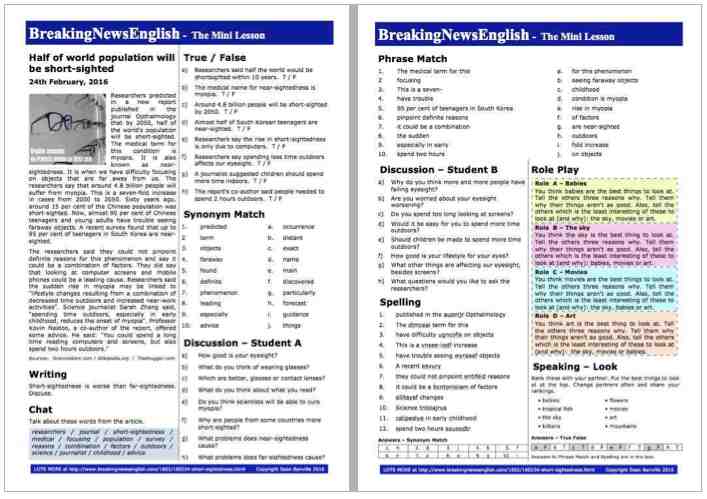The reading
Researchers predicted in a new report published in the journal Opthalmology that by 2050, half of the world's population will be short-sighted. The medical term for this condition is myopia. It is also known as near-sightedness. It is when we have difficulty focusing on objects that are far away from us. The researchers say that around 4.8 billion people will suffer from myopia. This is a seven-fold increase in cases from 2000 to 2050. Sixty years ago, around 15 per cent of the Chinese population was short-sighted. Now, almost 90 per cent of Chinese teenagers and young adults have trouble seeing faraway objects. A recent survey found that up 95 per cent of teenagers in South Korea are near-sighted.
Make sure you try all of the online activities for this reading and listening - There are dictations, multiple choice, drag and drop activities, crosswords, hangman, flash cards, matching activities and a whole lot more. Please enjoy :-)
The researchers said they could not pinpoint definite reasons for this phenomenon and say it could be a combination of factors. They did say that looking at computer screens and mobile phones could be a leading cause. Researchers said the sudden rise in myopia may be linked to "lifestyle changes resulting from a combination of decreased time outdoors and increased near-work activities". Science journalist Sarah Zhang said, "spending time outdoors, especially in early childhood, reduces the onset of myopia". Professor Kovin Naidoo, a co-author of the report, offered some advice. He said: "You could spend a long time reading computers and screens, but also spend two hours outdoors."
Sources:
- http://www.sciencealert.com/half-the-world-s-population-will-be-short-sighted-by-2050
- https://en.wikipedia.org/wiki/Myopia
- http://www.treehugger.com/family/remarkable-reason-why-nearsightedness-has-more-doubled-50-years.html


